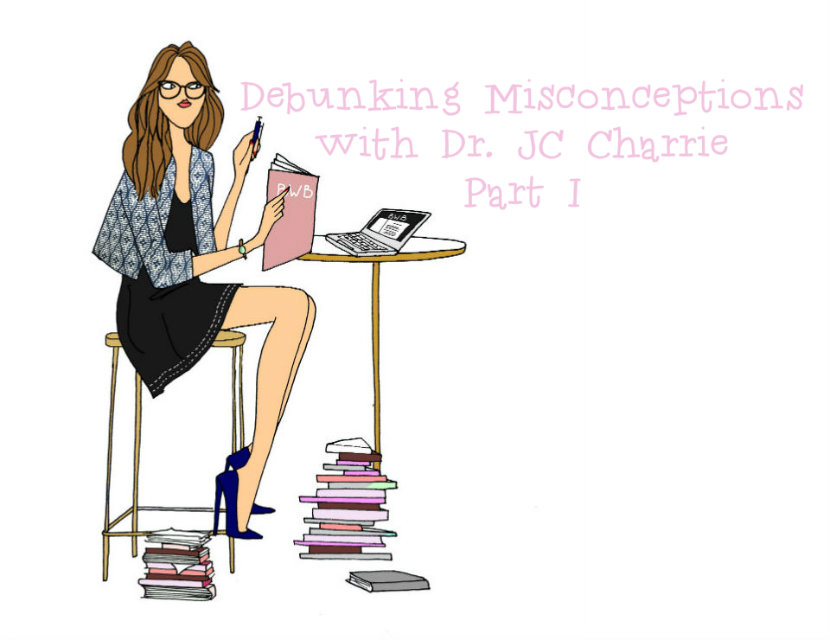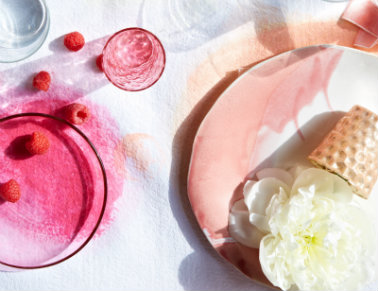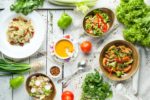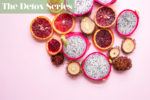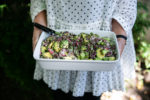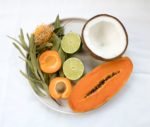Debunking Misconceptions with Dr. JC Charrié (Part I)
PART I
After asking the experts what we felt were the most pressing questions, here is their advice to tell true from false when it comes to our daily diet.
Meeting Dr Jean-Christophe Charrié and his team of general practitioners enabled me to become actively involved in caring for my health and that of my family. After two years of research alongside physicians dedicated to a field-based practice of medicine, preventive as well as curative, I’ve learnt simple steps to look after oneself naturally with plants, trace elements and diet. We co-authored two reader-friendly and fact-based books that allow readers to gain access to a real knowledge of health, so they won’t feel alone or powerless when faced with certain symptoms. While the waiting list to see Dr Charrié continues to lengthen, the advice given here and furthermore in our publications will help you along the path of good health.
After asking the experts what we felt were the most pressing questions, here is their advice to tell true from false when it comes to our daily diet.
BWB: Should we trust the work of food supplements? How do we recognized the good ones?
Not all food supplements are the same! The legislation of these products is complex and it’s possible that some of their formula has previously been labeled as “drugs based on natural products”. A lot of food supplements only contain over-the-counter plants, which are not exclusively sold in pharmacies, so be wary of these. Usually good quality products are the ones prescribed by a physician who understands your needs, and has read sufficient consumer health information.
Try to avoid combining food supplements, as many contain the same types of components such as zinc, and would make you exceed your recommended daily allowance.
If you are choosing supplements based on advertising or brand names, you are risking high disappointment. I would advise against the types of food supplements that are not based on natural products and may contain artificial vitamins. If you think you need food supplements but don’t want to seek your physician’s advice, consider supplementing with simple formula (4 or 5 products maximum) and avoid those containing too many different ingredients.
Try to avoid combining food supplements, as many contain the same types of components such as zinc, and would make you exceed your recommended daily allowance. Beware also of supplements with hormonal action, as these can be dangerous outside medical control.
A single Brazil nut provides all your daily needs in selenium, a very active anti-aging agent.
BWB: Is eating a brazil nut each morning enough to cover one’s daily need in selenium?
A single Brazil nut provides all your daily needs in selenium, a very active anti-aging agent. The Brazil nut is definitely a “superfood”. It is also very rich in magnesium.
Almond milk contains fiber, which stimulates intestinal transit and reduces the aging process of skin, bones, hair and nails. It is also full of vitamins and trace elements, as well as calcium.
BWB: Is a daily morning intake of almonds or almonds milk healthy?
Yes! The consumption of almonds is very efficient against gastric acidity. Slowly chewing ten or so almonds (the chewing process is important) will reduce discomfort associated with this acidity. Almonds are rich in mono-unsaturated fatty acids, which amount to half of its content in lipids. They help lower cholesterol, the “bad” one specifically, reducing the risks of heart disease. Unsalted, they also provide an excellent source of energy.
It is easy to prepare homemade almond milk each morning, and it is delicious! This drink contains fiber, which stimulates intestinal transit and reduces the aging process of skin, bones, hair and nails. It is also full of vitamins and trace elements, as well as calcium.
Using a substitute for sugar is the same thing as giving your bank advance funding but paying with counterfeit notes.
BWB: Sweeteners: friend or foe?
I am totally against sweeteners. Using a substitute for sugar, either natural or artificial, is equivalent to notifying your body about an imminent intake of sugar without providing sugar. It is the same thing as giving your bank advance funding but paying with counterfeit notes. Your body doesn’t like it; it disrupts its metabolism and neuronal cell function, leading to weight gain in the long run. If you can choose, a reasonable intake of real sugar is preferable.
BWB: Is it a good idea to eat raw butter daily at breakfast?
I would highly recommend eating raw butter in the morning, but it should be organic, as animal products contain high levels of pesticides and chemicals. Butter from organic farming will likely contain less endocrine disruptors. Few produce in a diet contain vitamin A, which is key again early eye ageing. Pasteurization destroys many vitamins; it is therefore essential to use raw butter. Good quality butter from a cow eating grass in an open countryside will protect your body, whereas its industrial counterpart, full of endocrine disruptors, will harm it.
It is recommended to take 3-week breaks from time to time, or to take week-long break monthly if you enjoy drinking lemon juice all year round.
BWB: Is having a freshly squeezed lemon juice with lukewarm water in the morning good for you?
This is a good remedy when suffering from gastric discomfort, bloating, lack of appetite, and morning sickness. It is also ideal in the morning following a heavy meal. However, I would advise not do it all year round; lemon helps activate mineralization in the body, but a high consumption has the opposite effect. It is therefore recommended to take 3-week breaks from time to time, or to take week-long break monthly if you enjoy drinking lemon juice all year round. If you prefer not to drink lemon juice regularly, you can do a cleanse one or twice yearly, as described in the book I co-wrote with Marie-Laure de Clermont-Tonnerre.
Eating dairy products three times a day is therefore a strictly commercial endeavor, which can exacerbate inflammatory disease and therefore be harmful to health.
BWB: Is eating dairy products three times a day against osteoporosis a good idea?
Animal milk is difficult to digest for the pancreas and increases expressions of inflammation – it can therefore increase pain for those suffering of rheumatism, for example. Milk is rich in calcium; however it is not the only calcium-rich food. A diverse and nutrient-rich diet such as found in the West is suitably rich in calcium for daily consumption – mineral waters, fish (sardines), leguminous plants (lentils) but also dried fruits and nuts.
Eating dairy products three times a day is therefore a strictly commercial endeavor, which can exacerbate inflammatory disease and therefore be harmful to health. Moreover, commercialized milk is more often than not “dead”, that is pasteurized, so it is better to choose unpasteurized milk if you want to drink cow milk.
BWB: Should we stop giving cow milk, even the organic kind, to our children?
You shouldn’t stop giving milk to your children, unless they suffer from an inflammatory disease or allergy. However, over-consumption should be avoided, as it puts strain on our children’s pancreas that is already over-worked because of their rapid growth.
BWB: Should one take prebiotics and probiotics all year round?
Prebiotics and probiotics are intestinal flora modifiers and should therefore be taken as part of a treatment and not all year round, else they can lead to gastric acidity.
BWB: To be organic or not to be?
Organic is always preferable, especially with animal products, though fruits and vegetable have to be peeled and washed. In any case, whatever the products used, it is always better to cook at home rather than eat mass-produced ready meals.
Cocoa is rich in magnesium and serotonin, which helps regulating the mood, and in anti-aging antioxidants (flavonoid) and protects against cardiovascular diseases such as high blood pressure, myocardial infarction, and blood clotting. Full of vitamins and trace elements, it also has a positive effect on memory, stress, immunity, inflammations, allergies and energy.
BWB: Should dark chocolate be considered a guilty treat or a delicious medication?
Cocoa is fine (unless you suffer from migraines) but chocolate (which is a recipe) is often too sweet and may contain milk.
Cocoa is rich in magnesium and serotonin, which helps regulating the mood, and in anti-aging antioxidants (flavonoid) and protects against cardiovascular diseases such as high blood pressure, myocardial infarction, and blood clotting. Full of vitamins and trace elements, it also has a positive effect on memory, stress, immunity, inflammations, allergies and energy.
Note also that it can trigger uric acid and oxalate stones episodes in predisposed sufferers. As it has a widening effect on the lower esophageal sphincter, it can lead to gastric reflux; it also contains elements that can increase stomach pain form an ulcer, without causing it as such.
Do not miss Part II, next week!
As general practitioner, Dr. JC Charrié won the national award for his doctoral thesis in 1998. He teaches clinical herbalism in France and abroad. Together with Marie-Laure de Clermont-Tonnerre, he’s the author of Se soigner toute l’année au naturel (A natural path to healing all year round), Prat Prisma Editions, 2012, and En bonne santé toute l’année : 20 cures alimentaires (Healthy all year round : 20 nutritional cleanses), Prat Prisma Editions, 2015.
Marie-Laure de Clermont-Tonnerre is a journalist and author.
«La médecine personnalisée, retrouver et garder la santé» (Odile Jacob) was published in March 2012 after two years of investigation and research with general practitioner Dr. Jean-Claude Lapraz.
«Se soigner toute l’année au Naturel» (Prat) was published in 2012 and has sold over 250 000 copies. Her latest book «Etre en Bonne santé toute l’année : 20 cures alimentaires» was launched in April 2015.


